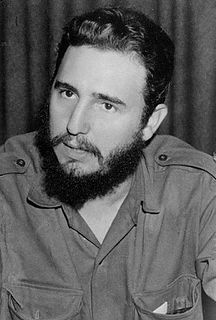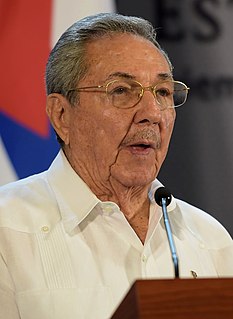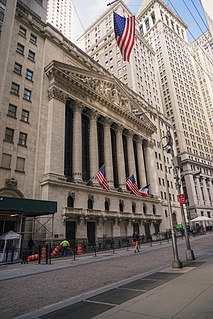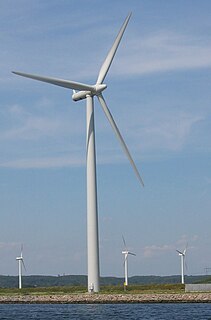Related Research Articles
Railtrack was a group of companies that owned the track, signalling, tunnels, bridges, level crossings and all but a handful of the stations of the British railway system from 1994 until 2002. It was created as part of the privatisation of British Rail, listed on the London Stock Exchange, and was a constituent of the FTSE 100 Index. In 2002, after experiencing major financial difficulty, most of Railtrack's operations were transferred to the state-controlled non-profit company Network Rail. The remainder of Railtrack was renamed RT Group plc and eventually dissolved on 22 June 2010.

Fidel Alejandro Castro Ruz was a Cuban revolutionary and politician who was the leader of Cuba from 1959 to 2008, serving as the prime minister of Cuba from 1959 to 1976 and president from 1976 to 2008. Ideologically a Marxist–Leninist and Cuban nationalist, he also served as the first secretary of the Communist Party of Cuba from 1961 until 2011. Under his administration, Cuba became a one-party communist state; industry and business were nationalized, and state socialist reforms were implemented throughout society.

Raúl Modesto Castro Ruz is a retired Cuban politician and general who served as the first secretary of the Communist Party of Cuba, the most senior position in the one-party communist state, from 2011 to 2021, succeeding his brother Fidel Castro.
Corporate governance is defined, described or delineated in diverse ways, depending on the writer's purpose. Writers focussed on a disciplinary interest or context often adopt narrow definitions that appear purpose-specific. Writers concerned with regulatory policy in relation to corporate governance practices often use broader structural descriptions. A broad (meta) definition that encompasses many adopted definitions is '“Corporate governance” describes the processes, structures, and mechanisms that influence the control and direction of corporations'.

A public company, publicly traded company, publicly held company, publicly listed company, or public limited company is a company whose ownership is organized via shares of stock which are intended to be freely traded on a stock exchange or in over-the-counter markets. A public company can be listed on a stock exchange, which facilitates the trade of shares, or not. In some jurisdictions, public companies over a certain size must be listed on an exchange. In most cases, public companies are private enterprises in the private sector, and "public" emphasizes their reporting and trading on the public markets.

Human rights in Cuba are under the scrutiny of Western human rights organizations, which accuse the Cuban government of committing systematic human rights abuses against the Cuban people, including arbitrary imprisonment and unfair trials. International human rights organizations such as Amnesty International and Human Rights Watch have drawn attention to the actions of the human rights movement and designated members of it as prisoners of conscience, such as Óscar Elías Biscet. In addition, the International Committee for Democracy in Cuba led by former statesmen Václav Havel of the Czech Republic, José María Aznar of Spain and Patricio Aylwin of Chile was created to support the "civic movement".

The Cuban Project, also known as Operation Mongoose, was an extensive campaign of terrorist attacks against civilians, and covert operations, carried out by the U.S. Central Intelligence Agency in Cuba. It was officially authorized on November 30, 1961 by American President John F. Kennedy. The name Operation Mongoose had been agreed at a prior White House meeting on November 4, 1961. The operation was run out of JM/WAVE, a major secret United States covert operations and intelligence gathering station established a year earlier in Miami, Florida, and led by United States Air Force General Edward Lansdale on the military side and William King Harvey at the CIA and went into effect after the failed Bay of Pigs Invasion.
Gerald Michael Nolan Corbett DL is a businessman who is the current chairman of the Marylebone Cricket Club (MCC). A businessman, over a long career he has been a director of thirteen public companies, seven of which he has chaired. He is currently chairman of Segro plc, the FTSE 100 international industrial property logistics group. He chaired Britvic plc for 12 years until September 2017. Britvic plc is the international soft drink company whose brands include Robinsons squash, J2O, Tango, Fruit Shoot, Ballygowan water and is also a bottler for PepsiCo. As chairman he led the flotation of Britvic in 2005. He was chairman of Betfair plc between 2012-16 when Betfair merged with Paddy Power plc to create Paddy Power Betfair.

London and Continental Railways (LCR) is a property development company owned by the Government of the United Kingdom for developing former railway land. The company was originally established in 1994 as a private consortium to own European Passenger Services and build the Channel Tunnel Rail Link (CTRL) under a contract agreed with the government.
Sir Thomas Philip Winsor is a British arbitrator and mediator, lawyer, consultant and economic regulatory professional.

Socially responsible investing (SRI), social investment, sustainable socially conscious, "green" or ethical investing, is any investment strategy which seeks to consider both financial return and social/environmental good to bring about social change regarded as positive by proponents. Socially responsible investments often constitute a small percentage of total funds invested by corporations and are riddled with obstacles.

The United Kingdom company law regulates corporations formed under the Companies Act 2006. Also governed by the Insolvency Act 1986, the UK Corporate Governance Code, European Union Directives and court cases, the company is the primary legal vehicle to organise and run business. Tracing their modern history to the late Industrial Revolution, public companies now employ more people and generate more of wealth in the United Kingdom economy than any other form of organisation. The United Kingdom was the first country to draft modern corporation statutes, where through a simple registration procedure any investors could incorporate, limit liability to their commercial creditors in the event of business insolvency, and where management was delegated to a centralised board of directors. An influential model within Europe, the Commonwealth and as an international standard setter, UK law has always given people broad freedom to design the internal company rules, so long as the mandatory minimum rights of investors under its legislation are complied with.

In 2008 the Northern Rock bank was nationalised by the British government, due to financial problems caused by the subprime mortgage crisis. In 2010 the bank was split into two parts to aid the eventual sale of the bank back to the private sector.

THG plc, also known as The Hut Group, is a British e-commerce retailer company headquartered at Manchester Airport, England. It operates over 100 international websites that take brands direct to consumer through its proprietary e-commerce platform Ingenuity. As of 2015, THG's sales had predominantly been outside the UK.

Attorney General of Belize v Belize Telecom Ltd[2009] UKPC 10 is a judicial decision of the Privy Council in relation to contract law, company law and constitutional law. It concerns the correct method for interpretation and implication of terms into a company's articles of association.
Environmental, social, and corporate governance (ESG) is an approach to evaluating the extent to which a corporation works on behalf of social goals that go beyond the role of a corporation to maximize profits on behalf of the corporation's shareholders. Typically, the social goals advocated within an ESG perspective include working to achieve a certain set of environmental goals, as well as a set of goals having to do with supporting certain social movements, and a third set of goals having to do with whether the corporation is governed in a way that is consistent with the goals of the diversity, equity, and inclusion movement.
ShareSoc is a campaigning organisation that represents and supports individual investors who invest in the UK stock markets. ShareSoc is a not for profit organisation with over 3,000 members, making it the UK's largest representative body for individual investors.
The UK Shareholders’ Association (UKSA) is a not-for-profit organisation limited by guarantee with over 500 members. It is the UK's oldest shareholder campaigning organisation, representing and supporting individual investors in the UK stock markets.
The early life of Cuban revolutionary and politician Fidel Castro spans the first 26 years of his life, from 1926 to 1952. Born in Birán, Oriente Province, Castro was the illegitimate son of Ángel Castro y Argiz, a wealthy farmer and landowner, and his mistress Lina Ruz González. First educated by a tutor in Santiago de Cuba, Fidel Castro then attended two boarding schools before being sent to El Colegio de Belén, a school run by Jesuits in Havana. In 1945 he began studying law at the University of Havana, where he first became politically conscious, becoming a staunch anti-imperialist and critic of United States involvement in the Caribbean. Involved in student politics, he was affiliated to Eduardo Chibás and his Partido Ortodoxo, achieving publicity as a vocal critic of the pro-U.S. administration of President Ramón Grau and his Partido Auténtico.
A shareholder nomination to the AGM committee SNAC sometimes called a 'Shareholder Committee') is a voluntary committee formed with the Chairman of the Board to assess the current Directors and discuss potential future Directors. A shareholder committee typically holds two or three short meetings a year.
References
- ↑ Lickel, Brian; Hamilton, David L.; Sherman, Steven J. (2001). "Elements of a Lay Theory of Groups: Types of Groups, Relational Styles, and the Perception of Group Entitativity" (PDF). Personality and Social Psychology Review. 5 (2): 129–140. doi:10.1207/S15327957PSPR0502_4. S2CID 3899125.
- ↑ Pearson, Adrian (2009-12-22). "Appeal bid denied for Northern Rock shareholders". The Journal . Archived from the original on 2009-12-25. Retrieved 2009-12-22.
- ↑ RPSAG: Appeal Decision [ permanent dead link ] RPSAG, 21 October 2005